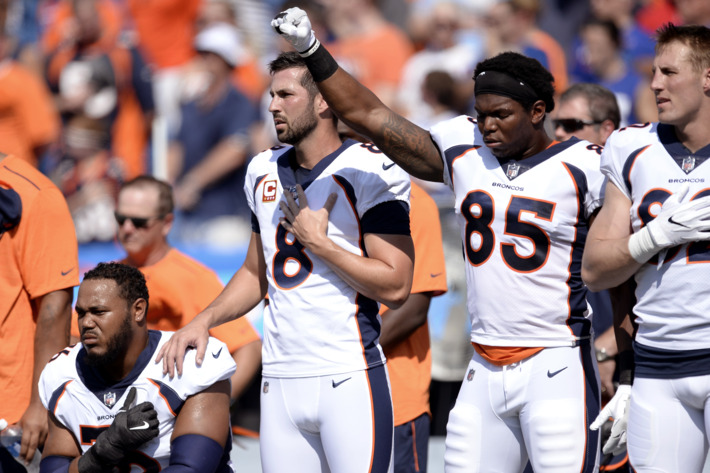
The days of NFL players protesting during the national anthem are numbered.
That much is obvious following Roger Goodell’s letter to NFL owners Tuesday and comments made by league spokesman Joe Lockhart. Attempts to re-package the protests as a fan-friendly call for “unity” have failed, and President Donald Trump will continue his rants against the league as long as they inflame division and detract from his own failures and inaction.
So the NFL is looking for a way out. Desperately.
“The controversy over the anthem is a barrier to having honest conversations and making real progress on the underlying issues,” Goodell wrote.
“Everyone involved in the game needs to come together on a path forward to continue to be a force for good within our communities, protect the game, and preserve our relationship with fans throughout the country.”
The owners are meeting in New York next Tuesday, and while Lockhart said nothing specific has been proposed, what to do about the protests will be on the agenda. The first order of business, most likely.
Jerry Jones has already declared he’ll bench any of the Dallas Cowboys who protest. Whether that’s even allowed under the collective bargaining agreement remains unclear and, with the Cowboys having a bye this week, Jones may have known it was a moot point, anyway.
Lockhart wouldn’t get drawn into what the owners might seek, saying he’s sure there will be a “variety of options.” That could be from banning players who demonstrate to keeping teams in the locker rooms until after the anthem is over, as was the policy until 2009.

In his letter, Goodell mentioned an “in-season platform to promote the work of our players on these core issues, and that will help to promote positive change in our country.”
“We need to move past this controversy,” Goodell wrote, “and we want to do that together with our players.”
That’s where it gets sticky.
Goodell and Lockhart can talk all they want about the “unprecedented dialogue” between the league and its players, and tout the ride-alongs with local police. But the players remain skeptical about whether the NFL actually cares or just wants them to stick to sports like good little football players.
“Really bruh? It’s hard trying to play both sides of the fence when it comes down to injustice and your money huh?” Green Bay Packers tight end Martellus Bennett said, addressing Goodell on Twitter.
The issues that sparked the protests – police brutality against men of color and racial inequality – are of real and serious concern to players. But aside from the San Francisco 49ers, the NFL and its teams were largely silent until Trump last month called the players involved “SOBs” and said they should be fired.
That was more than a year after the protests began.
Even when the league did get involved, rather than have hard conversations about racism and discrimination, the NFL preached “unity” without saying exactly what that meant.
“Savvy viewers of the NFL’s `unity’ efforts could see that owners were not protesting the same thing that many players were protesting. (Colin) Kaepernick and other players protested police brutality and racial injustice; owners protested President Trump making it more difficult for them to use black players to make money,” Glenn Bracey, a sociology professor at Villanova who specializes in racism and social movements, said via email.
“In any case, President Trump and NFL owners’ actions brought more attention to the core issue, which is racist policing.”
It’s true a small fraction of players in the NFL have protested. But awareness and support for the cause has grown this season, and players aren’t likely to take too kindly to simply being told to stand up and shut up.
“Goodell willfully obscures the actual issue, which is racist policing and discrimination, by discussing the protests as `the controversy over the national anthem,’” Bracey said. “Further, he implies that players’ protests are actually a problem, implying the protests prevent ‘making real progress on the underlying issues.'”
If the NFL wants to defuse the tension and put the focus back on football — and it most certainly does — it’s going to take more than an edict. It will have to find a way to make it worth the players’ while, make them feel they’ve accomplished their goals or have a comparable platform by which to do so.
The protests aren’t about the anthem or the flag. They never have been. The NFL needs to recognize that now more than ever.
By Nancy Armour
This article was republished with permission from the original author and 2015 Ronald Reagan Media Award recipient, Nancy Armour, and the original publisher, USA Today. Follow columnist Nancy Armour on Twitter @nrarmour.